Iraq's Kurds Face Iranian Opposition To Energy Development, PM Says
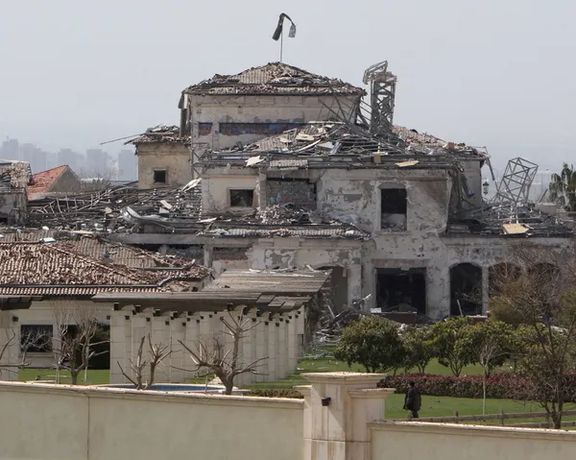
The development of oil and gas in Iraq's northern Kurdish region may not be in the interest of Iran, Kurdish Prime Minister Masrour Barzani said on Tuesday.

The development of oil and gas in Iraq's northern Kurdish region may not be in the interest of Iran, Kurdish Prime Minister Masrour Barzani said on Tuesday.
Attacks on the region's capital Erbil and the federal government's legal actions have demonstrated the resistance to development in the energy-rich region.
Iran's Islamic Revolutionary Guard Corps (IRGC) said early this month it struck Israeli "strategic centers" in Erbil in retaliation for an Israeli air raid that killed two of its members in Syria.
But most of the 12 missiles fired into the Kurdish capital hit the villa of a Kurdish businessman involved in the autonomous region's energy sector.
A Kurdish gas export plan could threaten Iran's place as a major supplier to Iraq and Turkey when its economy is reeling from international sanctions, sources told Reuters. The pipeline could send energy via Turkey to Europe at a time that Iran is under US sanctions and its ally, Russia wants to preserve its dominance in Europe’s markets.
The attack was shortly after Iraq's federal court deemed an oil and gas law regulating the oil industry in Iraqi Kurdistan unconstitutional and demanded that Kurdish authorities hand over their crude supplies.
Speaking at an industry event in the United Arab Emirates, Barzani said the court ruling was political and that Kurdistan is negotiating with the Iraqi federal government to preserve what he called their constitutional rights.
Reporting by Reuters
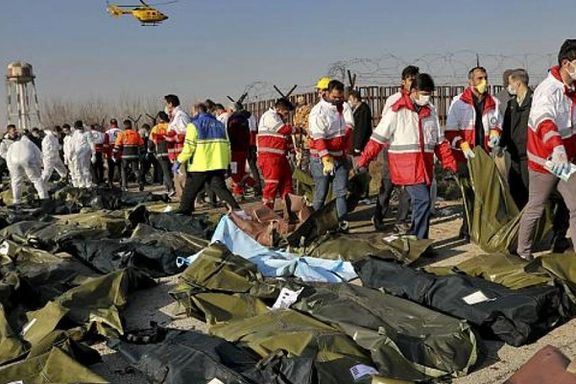
Canada says changes are needed in global rules about air accident investigations such as the 2020 downing of a Ukrainian jetliner by Iran.
A government source said on Monday that Canada is expected to call on Safer Skies forum for improving international rules governing investigations for air accidents.
According to the source, Canadian Transport Minister Omar Alghabra is to tell the forum that reforms are especially needed in cases where the main country probing a crash, caused or participated in the downing of the aircraft.
Hosted virtually by Transport Canada and the Safer Skies Consultative Committee on Tuesday and Wednesday, the forum brings international representatives and the civil aviation industry, including the International Air Transport Association, to mitigate airspace risks over conflict zones.
Canada's Transportation Safety Board (TSB), an independent agency, called for such changes in 2021, arguing Iran's downing of flight PS752 showed the limitations of current rules.
The TSB argued that under those rules, Iran retained overall control of the investigation into the crash which killed all 176 onboard, while the country's military was implicated in the event leading to an "unprecedented" situation.
After three days of denial, Tehran claimed Revolutionary Guards “accidentally” shot down the Boeing 737 jet by two surface-to-air missiles in the tense aftermath of Iran's missile attack on United States military bases in Iraq on January 8, 2020.
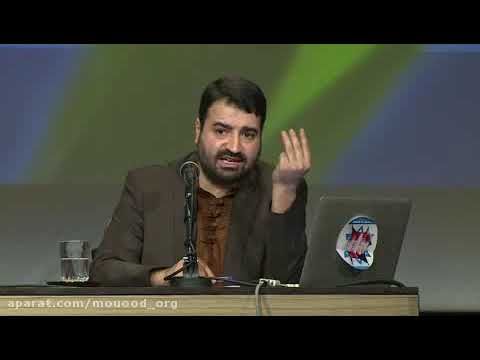
An Iranian official who is an advisor to the parliament for plan to restrict the internet has openly talked about Iran’s network of fake accounts and disinformation campaigns.
In a recent interview, Ruhollah Mo’men-Nasab -- a former head of Culture Ministry’s Digital Media Center and the current secretary of cyberspace activities of the Popular Front of Islamic Revolution Forces political party – talked about their tactics to disrupt the flow of information and tarnish the image of activists.
He is an outspoken opponent of social media platforms and free internet access, describing them as espionage tools, and has been a consultant and staunch supporter of the bill pushed by hardliners to limit internet in Iran, entitled 'Legislation to Protect Cyberspace Users'.
In a video of his remarks that surfaced last week, Mo’men-Nasab seems quite pleased with the result of their misinformation campaigns, elaborating that they made numerous counterfeit twitter accounts with photos and names of influential rights and political activists “who were against the revolution and interests” of the regime.
Describing the disinformation network as part of a psychological warfare, Mo’men-Nasab said they have made software for the tweets and retweets and had created at least 256 accounts to make the process faster and more effective.
Twitter and Facebook have been suspending or shutting down hundreds of Iranian fake accounts over recent years, suspected of spreading disinformation, even in during elections in the United States.
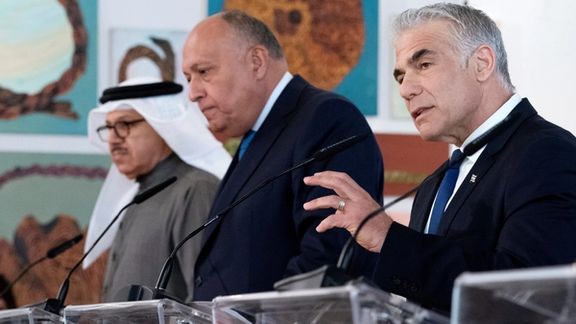
Iran’s foreign ministry has harshly condemned the historic Negev Summit between foreign ministers of four Arab states, Israel and the US Secretary of State.
Calling the gathering "an evil meeting in the occupied territories," spokesman Saeed Khatibzadeh said the summit of foreign ministers of Israel, Egypt, the United Arab Emirates, Bahrain, and Morocco, also attended by the US Secretary of State Antony Blinken, was a "betrayal of the cause of Palestine".
The participants in the summit met on Monday to display their unity against Iran. The Arab states also used the rare event to press Israel to return to the long-stalled peace talks with the Palestinians.
Tel Aviv says the event would be repeated and expanded. "This new architecture - the shared capabilities we are building - intimidates and deters our common enemies, first and foremost Iran and its proxies," Israeli Foreign Minister Yair Lapid said Monday alongside his US, Emirati, Bahraini, Moroccan, and Egyptian counterparts.
"As neighbors and, in the case of the United States, as friends, we will also work together to confront common security challenges and threats, including those from Iran and its proxies," Lapid, who initiated the summit said.
"Any move to normalize and establish relations with the terrorist Zionists and the occupiers of al-Quds (Jerusalem) is a stab in the back of the oppressed Palestinian nation and a gift to the child-killing Israeli regime to continue the killing of the [Palestinian] people and occupation of their land," Khatibzadeh said.
According to the Jerusalem Post, Blinken clarified behind closed doors that the US has not made a final decision regarding the removal of the Iranian Revolutionary Guards (IRGC) from its Foreign Terrorist Organization (FTO) list, which all the five other countries strongly opposed.

History has proven that the "process of compromise and submission" has brought its advocates "nothing but defeat and humiliation," Khatibzadeh said while reiterating that Iran is prepared to cooperate with regional countries and expand its relations with them "to counteract the Zionist and American plots that aim to sow discord and spread instability in the West Asia region."
Tehran’s harsh words came as it has been negotiating for almost a year with Western powers to revie the 2015 nuclear agreement, JCPOA. The last main hurdle is Iran’s demand to remove the IRGC from the US terrorism list.
The UAE, Bahrain and Morocco normalized ties with Israel under a 2020 US initiative known as the Abraham Accords.
On Monday, in an unattributed commentary entitled "Some Truths About the Historical Meeting of Delusional [Leaders] At Negev Desert", Nour News website tried hard to downplay the importance of the meeting and claimed the summit only revealed that Israel is not able to create a coalition against Iran and the "resistance [front]".
The ‘resistance front’ is a term coined by Tehran to describe its allies and proxies throughout the region.
"Iran's recent attack on the Mossad base in Erbil and intensification of the missile and drone attacks of [the Houthis of] Yemen on strategic locations in Saudi Arabia and the United Arab Emirates in recent days revealed that no plot can stop the resistance front in fulfilling security and stability in the region and counteracting the mercenaries of the West," Nour News which is affiliated to the secretary of Iran's Supreme National Security Council (SNSC), Ali Shamkhani, wrote.
"All this shows the fact that the Resistance [Front] led by the Islamic Iran is now the main player in the region," the commentary said.
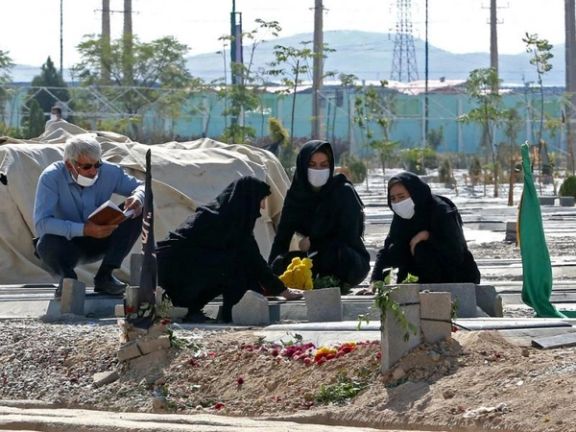
The number of deaths in Iran since Covid-19 began has been 300,000 higher than previous years, suggesting pandemic deaths may be more than officially reported.
Iran has reported around 140,000 deaths from Covid since the beginning of the pandemic, the Middle East’s highest official level, leaving 160,000 more deaths unexplained.
The latest data from Iran’s national organization for civil registration puts average deaths at 370,000 thousand people for the four years up to March 20, 2020 when the pandemic began. In the first year (ending March 20, 2021) deaths rose to 510,000 and in the second year to 530,000.
Iran's judiciary accepted in March a lawsuit against Supreme Leader Ali Khamenei and others for manslaughter “of over 100,000 Iranians" after Khamenei in January 2021 ruled out importing United States- and British-made Covid vaccines. Using calculations based on statistics like burials in Tehran, some have suggested that the true number of deaths could be as high as 500,000.
If Iran’s Covid deaths were 300,000, the rate relative to population would be comparable to Brazil, the United States and many European countries.
Researchers tracking the pandemic globally have noted that “excess deaths” reflect many factors, including those indirectly due to Covid including stretched health system.
A study published by the Lancet this month suggested that in the first two years of the pandemic − up to December 31, 2021 −there were globally 18 million excess deaths, with only 6 million officially attributed to Covid.
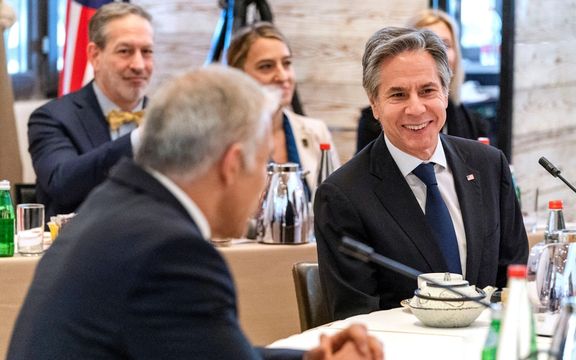
The United States, Israel and four Sunni Arab countries concluded two days of talks on Monday, vowing to expand and make the ‘Negev Summit’ a “permanent forum.”
Wrapping-up the landmark gathering Monday at Sde Boker, Negev, those taking part said the forum would build commercial and security ties with other Sunni Arab states. Unlike Bahrain, Morocco and the UAE, Saudi Arabia has held back from ‘normalization’ with Israel, which Arab League policy conditions on Israel recognizing Palestinian statehood.
“We are today opening a door before all the peoples of the region, including the Palestinians, and offering them to replace the way of terror and destruction with a shared future of progress and success," Israeli foreign minister Yair Lapid said.
"This new architecture -- the shared capabilities we are building -- intimidates and deters our common enemies, first and foremost Iran and its proxies," Lapid added alongside his counterparts from the United States, United Arab Emirates, Bahrain, Morocco and Egypt.
The summit participants decided to make it into a “permanent forum”, Lapid said, adding that its doors were open to “all the peoples of the region, including the Palestinians".
Expressing US commitment to reviving the 2015 Iran nuclear deal, which Israel and some Gulf Arab states oppose, Secretary of State Antony Blinken said the US would work with “friends…to confront common security challenges and threats, including those from Iran and its proxies.”
"As neighbors and, in the case of the United States, as friends, we will also work together to confront common security challenges and threats, including those from Iran and its proxies”, Blinken said.
The UAE, Bahrain and Morocco normalized ties with Israel under the 2020 US-mediated Abraham Accords. In 1979, Egypt became the first Arab state to make peace with Israel.
Bahrain Foreign Minister Abdullatif Al Zayani described the discussions as helpful to fend off Iranian-backed groups like Hezbollah. "Of course, part of this process will be renewed efforts to resolve the Palestinian-Israeli conflict," he added.
As the four Arab states’ foreign ministers gathered in Israel to discuss the Iranian threat with the United States, Arab gunmen killed two Israeli policemen Sunday night.
Iran’s Fars news agency, which is affiliated to Iran’s elite Islamic Revolutionary Guard Corps (IRGC),splashed a headline on its website saying Hezbollah congratulated the “martyrdom” operation.
Morocco's Foreign Minister Nasser Bourita said on Monday that his attendance at the meeting in Sde Boker was the "best response to such attacks”.